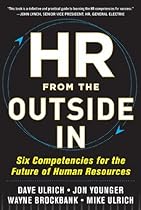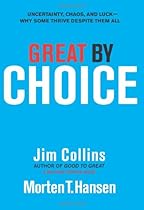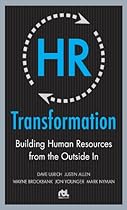Amazon.com Review
Jim Collins on the Writing Process
When I first embarked on a career that required writing, I devoured dozens of books about the process of writing. I soon realized that each writer has weird tricks and idiosyncratic methods. Some wrote late at night, in the tranquil bubble of solitude created by a sleeping world, while others preferred first morning light. Some cranked out three pages a day, workmanlike, whereas others worked in extended bursts followed by catatonic exhaustion. Some preferred the monastic discipline of facing cinder-block walls, while others preferred soaring views.
I quickly learned that I had to discover my own methods. Most useful, I realized that I have different brains at different times of day. In the morning, I have a creative brain; in the evening, I have a critical brain. If I try to edit in the morning, I'm too creative, and if I try to create in the evening, I'm too critical. So, I go at writing like a two piston machine: create in the morning, edit in the evening, create in the morning, edit in the evening…
Yet all writers seem to agree on one point: writing well is desperately difficult, and it never gets easier. It's like running: if you push your limits, you can become a faster runner, but you will always suffer. In nonfiction, writing is thinking; if I can't make the words work, that means I don't know yet what I think. Sometimes after toiling in a quagmire for dozens (or hundreds) of hours I throw the whole effort into the wastebasket and start with a blank page. When I sheepishly shared this wastebasket strategy with the great management writer Peter Drucker, he made me feel much better when he exclaimed, "Ah, that is immense progress!"
The final months of completing Great by Choice required seven days a week effort, with numerous all-nighters. I had naively hoped after writing Good to Great that perhaps I had learned enough about writing that this work might not require descending deep into the dark cave of despair. Alas, the cave of darkness is the only path to producing the best work; there is no easy path, no shorter path, no path of less suffering. Winston Churchill once said that writing a book goes through five phases. In phase one, it is a novelty or a toy; by phase five, it is a tyrant ruling your life, and just as you are about to be reconciled to your servitude, you kill the monster and fling him to the public. And so, exiting the caving blinking in the sunlight, we've killed the monster and hereby fling. We love this book, and have great passion about sharing it with the world—making all the suffering worthwhile.
A Q&A with Morten T. Hansen Q: How did you and Jim develop ideas together during the research?
Hansen: During our hundreds of research meetings—what we called "chimposiums" (as when two curious chimps get together), Jim and I probed the data, exchanged views, and debated vigorously. We didn't always agree, in which case we did some more analysis to get to the main findings we report in Great by Choice.
Q: Why did Great by Choice take nine years of effort?
Hansen: When Jim and I started out some nine years ago, we did not anticipate that it would take us this long, nor did we know what the results would be. We followed a simple principle—carry out the absolutely best research we could possibly do, no matter how long.
Q: Did you find what you expected, or surprises?
Hansen: The way we did the research was to explore why some companies attained great performance over the long-run while others did not. We did not start with any preconceived ideas and hypotheses about what made the difference. We let the data speak. What we found, and what we report in the book, surprised us a great deal. A few times we scratched our heads because we were so surprised, but that's what the data revealed.
Q: Did you have fun?
Hansen: Analyzing the data, debating, and arriving at some really interesting insights was a great deal of fun. It created joy in my life. It may not be everyone's idea of having a good time, but Jim and I always looked forward to our chimposiums. I hope you will enjoy Great by Choice as much as Jim and I enjoyed the research process!
Review
"A sensible, well-timed and precisely targeted message for companies shaken by macroeconomic crises" (Financial Times )
"Collins and Hansen draw some interesting and counterintuitive conclusions from their research….far from a dry work of social science. Mr. Collins has a way with words, not least with metaphor." (Wall Street Journal )
Entrepreneurs and business leaders may find the concepts in this book useful for making choices to increase their odds of building a great company. (Booklist )
From the Back Cover
The new question
Ten years after the worldwide bestseller Good to Great, Jim Collins returns with another groundbreaking work, this time to ask: Why do some companies thrive in uncertainty, even chaos, and others do not? Based on nine years of research, buttressed by rigorous analysis and infused with engaging stories, Collins and his colleague, Morten Hansen, enumerate the principles for building a truly great enterprise in unpredictable, tumultuous, and fast-moving times.
The new study
Great by Choice distinguishes itself from Collins's prior work by its focus not just on performance, but also on the type of unstable environments faced by leaders today.
With a team of more than twenty researchers, Collins and Hansen studied companies that rose to greatness—beating their industry indexes by a minimum of ten times over fifteen years—in environments characterized by big forces and rapid shifts that leaders could not predict or control. The research team then contrasted these "10X companies" to a carefully selected set of comparison companies that failed to achieve greatness in similarly extreme environments.
The new findings
The study results were full of provocative surprises. Such as:
- The best leaders were not more risk taking, more visionary, and more creative than the comparisons; they were more disciplined, more empirical, and more paranoid.
- Innovation by itself turns out not to be the trump card in a chaotic and uncertain world; more important is the ability to scale innovation, to blend creativity with discipline.
- Following the belief that leading in a "fast world" always requires "fast decisions" and "fast action" is a good way to get killed.
- The great companies changed less in reaction to a radically changing world than the comparison companies.
The authors challenge conventional wisdom with thought-provoking, sticky, and supremely practical concepts. They include: 10Xers; the 20 Mile March; Fire Bullets, Then Cannonballs; Leading above the Death Line; Zoom Out, Then Zoom In; and the SMaC Recipe.
Finally, in the last chapter, Collins and Hansen present their most provocative and original analysis: defining, quantifying, and studying the role of luck. The great companies and the leaders who built them were not luckier than the comparisons, but they did get a higher Return on Luck.
This book is classic Collins: contrarian, data-driven, and uplifting. He and Hansen show convincingly that, even in a chaotic and uncertain world, greatness happens by choice, not chance.
http://astore.amazon.com/amazon-book-books-20/detail/0062120999



